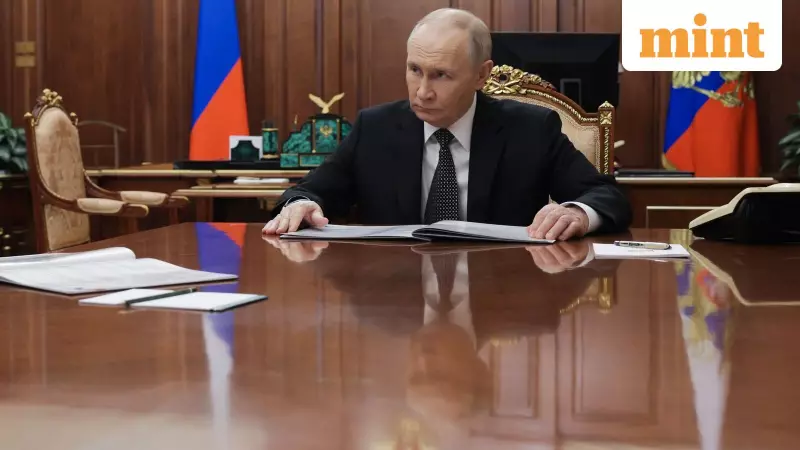
In a sweeping move that is reshaping the future of its youth, Russia is accelerating the militarisation of its education system. Classrooms across the country are being converted into training grounds where students, some as young as six years old, are taught military discipline and handling weapons by active-duty soldiers.
From First Grade to the Front Line
This radical transformation was starkly visible this autumn in a school in the Kursk region, which borders Ukraine. Russian state television broadcast footage of first-graders, aged just six to eight, standing to attention as a soldier who had served on the front lines in Ukraine inspected their uniforms. The serviceman barked orders to adjust their collars and belts, a drill that was followed by a regular Russian language lesson.
This is not an isolated incident. The Kremlin is deeply embedding military-style training and war-centric topics into the school curriculum. The initiative gained momentum after the annexation of Crimea in 2014 but was supercharged by the full-scale invasion of Ukraine in 2022. As the conflict nears its fourth year, the focus has intensified on the youngest grades.
By the time students reach eighth grade, weapons training is no longer extracurricular—it is mandatory. Teenagers are now taught army discipline, military history, and practical skills like assembling Kalashnikov rifles and operating drones.
A Systemic Overhaul for Patriotic Indoctrination
This campaign extends far beyond occasional drills. The Russian Defence Ministry oversees the Youth Army, a youth movement with a claimed membership of 1.85 million children between the ages of 8 and 18, which is fully integrated into the school system. Members wear military-style uniforms and red berets, stand guard at ceremonies, and attend regular army training sessions.
Analysts believe this vast indoctrination push is designed to rear a generation of militarised patriots. "If you take school-age children and indoctrinate them properly, then they will become cheaper and more efficient soldiers for any kind of war you may plan in the future," explained political scientist Ekaterina Schulmann, describing the Kremlin's apparent logic.
President Vladimir Putin has made no secret of this ambition. In December 2023, he explicitly stated, "Wars are won not by generals, but by schoolteachers," and called on soldiers to enter classrooms. A state program now fast-tracks teaching applications for active-duty servicemen.
Curriculum, Textbooks, and Billions in Funding
The changes are codified in a new national curriculum. Schools now begin each week with "Conversations about Important Things," an hour-long class aimed at instilling conservative Russian values. For preschoolers, the teaching material declares, "To live means to serve your Motherland."
A new subject for older students, "Foundations of Security and Defence of the Motherland," includes detailed instruction on weapons like the Kalashnikov rifle, the RPK machine gun, and the RPG grenade launcher, alongside lectures on psychological operations.
History education has been completely overhauled. New textbooks, co-written by Vladimir Medinsky, Russia's chief negotiator on Ukraine, portray the West as an enemy and make unsubstantiated claims. An 11th-grade textbook describes Ukraine as an ultranationalist state and alleges, without evidence, that the U.S. operated secret biolaboratories there.
The financial commitment is enormous. Government statistics show that funding for "patriotic education" skyrocketed from 3.5 billion rubles ($42 million) in 2021 to over 50 billion rubles (almost $600 million) in 2024. This year, an additional four billion rubles was earmarked to equip 23,000 schools with model Kalashnikovs, grenades, and drone kits.
Consequences and Controversy
This new curriculum is also being forcibly implemented in occupied parts of Ukraine, where Ukrainian-language books have been seized and destroyed, and the nation's history is scrubbed from timetables.
While many parents in Russia support the changes, teachers and education experts warn of dire consequences. They fear the indoctrination is creating a jingoistic, unquestioning generation that will perpetuate Russian warmongering.
"When a child is handed a rifle and told 'Putin is our pride,' and that Ukraine is where enemies who want to destroy us are living, they don't have the critical thinking to say: 'No, wait, it's not that way,'" said Dima Zicer, a Russian education expert living abroad.
Dissent is not tolerated. Teachers who refuse to deliver the militarised curriculum face severe repercussions. In a prominent case, a Moscow court sentenced teacher Natalia Taranushenko to seven years in jail for informing her students about atrocities committed by Russian troops. She had already fled the country by the time of her sentencing.
As the war grinds on, Russia's classrooms are being systematically prepared to supply the front lines of tomorrow, cementing a culture of militarism at the heart of its education system.





